By Yoo Kyung Sung, University of New Mexico, Albuquerque NM
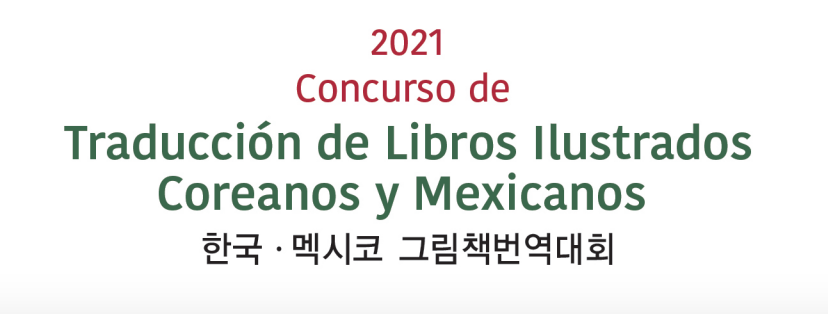 This month, I invite the WOW Currents audience to partake in global intercultural and language celebration events that unite young and adult readers with languages and cultures from contemporary nations across diverse countries. This edition of WOW Currents invites readers to take a closer look at select award-winning books from recent translation competitions, including Korean to Spanish, Spanish to Korean, Korean to Arabic, and Arabic to Korean languages. The award ceremonies for these competitions were held at the Korean Embassy in Mexico City and the Seoul International Book Exhibition, marking significant intercultural solidarity programs in the field of translation and cultural exchange.
This month, I invite the WOW Currents audience to partake in global intercultural and language celebration events that unite young and adult readers with languages and cultures from contemporary nations across diverse countries. This edition of WOW Currents invites readers to take a closer look at select award-winning books from recent translation competitions, including Korean to Spanish, Spanish to Korean, Korean to Arabic, and Arabic to Korean languages. The award ceremonies for these competitions were held at the Korean Embassy in Mexico City and the Seoul International Book Exhibition, marking significant intercultural solidarity programs in the field of translation and cultural exchange.
During my university teaching experiences in Arizona and New Mexico, I had the opportunity to interact with many teacher candidates. The majority of college students I encountered expressed a preference for watching American films over foreign ones with English subtitles in languages other than English. This was in contrast to my own upbringing in South Korea, where both dubbed movies and movies with subtitles were common ways to enjoy foreign content. Many of my former students in Arizona and New Mexico found it inconvenient to read extra text while watching a film, as they felt it distracted them from the on-screen action.
The Korean filmmaker Bong Joon-ho, who won an Oscar in 2020, appeared to recognize that subtitles could be seen as a barrier for viewers in the United States. In his speech, Bong (2020) stated, “Once you overcome the one-inch tall barrier of subtitles, you will be introduced to so many more amazing films.” In recent years, it appears that attitudes towards foreign films have evolved, or at least become more inclusive. The COVID-19 pandemic has played a role in these changes.
During and after the COVID-19 pandemic, there was a significant increase in the number of Over-the-Top (OTT) media service reviewers, such as Netflix, Hulu, and Apple TV. Notably, viewers’ attitudes towards non-English language content have shifted. Lucas Shaw (2023) of Bloomberg highlights, “By adding subtitles and dubbing to Korean series, Netflix was able to introduce the programming to new viewers in Latin America, Europe, and the U.S. The onset of the pandemic only heightened interest from audiences overseas.”
In the realm of children’s literature, the study of translations and foreign language experiences remains a relatively marginalized area in the U.S. when compared to Europe and Asia. Fortunately, the United States Board for Books for Young People’s (USBBY) Outstanding International Books award recognizes international literature. Nevertheless, over the last two decades, there have been few chapter books published from South Korea, and even with picturebooks there’s often a loss of the original text’s nuances as publishers tend to present them as dominant visual narratives.
Take, for example, books like Look Up by Jin-ho Jung and While We Were Out, where significant elements of the original text are omitted in an attempt to cater to U.S. readers. For example, in Look Up the protagonist, Suji, is involved in a car accident and ends up in a wheelchair in the Korean edition. In contrast, the U.S. edition removes the background narratives and even alters the protagonist’s name to make it more accessible for English speakers. While I could delve deeper into the concept of “lost in translation,” this article’s focus lies elsewhere.
For a considerable period, publishers held the power to select and republish international books, leaving readers in a passive position where they read whatever was available in English through the publishers’ efforts. However, there’s been a recent shift, with the Korean Board on Books for Young People (KBBY) becoming involved in translation as a means to promote Korean picturebooks and various global languages beyond English. What particularly caught my attention is the fact that these translators are enthusiasts, amateurs who appreciate Korean picture books as well as picture books from their own countries.
In the first two years, the Korean Picture Book and Mexican Picture Book Translation Competitions were successfully held. The competition procedure is outlined as follows:
- Initially, KBBY selected works that could effectively showcase the current state and unique characteristics of Korean picture books, as well as the diverse personalities of the authors, while ensuring the text was suitable for translation. Collaborating with the Korean Cultural Center in Mexico, they selected works that had high acceptability and readability for translation within Mexico, which were then categorized by levels. A total of 20 works made it to the shortlist.
- The Korean Cultural Center in Mexico, in collaboration with universities in Mexico offering Korean language departments and institutions providing Korean language courses like the Sejong Institute, distributed these picture books to students.
- The submitted translations underwent evaluation by various individuals, including Spanish translators, professors, and other experts at KBBY, who determined the award-winning translations.
- The award ceremony was jointly organized with the Mexican Cultural Center and the Embassy in Mexico City.
The first Korean Picture Book Translation Competition Award Ceremony was held at the Korean Embassy in Mexico City in 2020, marking a significant event in the field of translation and cultural exchange. Prominent figures present at the event included Ambassador Seo Jung-in, Director Park Young-doo of the Korean Cultural Center in Mexico, and Chairwoman of the Mexico-Korea Friendship Parliamentary Group, Baustista Han, a member of the Mexican House of Representatives. Ambassador Seo Jung-in remarked, “This event signifies the cultural exchange between Mexico and Korea, which has produced a Nobel laureate and renowned poet, Octavio Paz, and excels in the field of picturebooks. We hope that this event will serve as a catalyst for expanded publishing exchanges between our two countries.” Words of encouragement were also sent by the Presidents of Universidad Iberoamericana and the Asia Research Institute of Universidad Anáhuac.
The Grand Prize was awarded to Valeria Contreras (University of Baja California graduate program) for her translation of Danranhan Gajok Babiana (Yeongmin Publishing & Bookworks). Selected as a perfect translation through the evaluation by judges, including Professor Yoon Seon-mi, recipient of the Korean Translation Literature Award, Valeria Contreras expressed, “Through literature, I feel I’ve come closer to Korean culture. It was truly a fulfilling experience.”
The 2nd Korea-Mexico Picture Book Translation Competition, co-hosted by KBBY International Children and Youth Book Association and the Korean Cultural Center in Mexico, concluded its seven-month cross-border competition from April to October in 2021 and held an awards ceremony on December 11, 2021 in Mexico City. In this competition aimed at promoting the exchange of picturebooks between the two countries, 15 Korean picturebooks and 5 Mexican picturebooks were selected through a call for entries. Local Mexicans and Korean residents were invited to translate these works, resulting in the selection of 13 award-winning translators.
Maria Bouillon, who received the Spanish translation award for Dad Goes to the Swimming Pool (Yujin/Hanlim Publishing), expressed the challenges she faced in translating onomatopoeia and mimetic words. She shared her aspiration to further enhance her Korean language skills and become a professional Korean translator. Ambassador Seo Jung-in, the Korean Ambassador to Mexico, delivered a speech acknowledging the historical significance of Korea’s book culture, including the world’s first metal movable type, and emphasized the importance of vibrant book exchanges for the dreams of future generations.
Nuestra Publishing House, which published Kim Young-ha’s Black Flower, announced plans to intensify its efforts to introduce Korean books. Director Park Young-doo of the Korean Cultural Center in Mexico stated that after the first translation competition, they organized several competitions and various book exhibition events. He expressed his commitment to continue working on the development of the competition. The event showcased works completed during a picturebook creation workshop conducted by the Korean Cultural Center, attracting attention at the awards ceremony.
The below examples (Figure 2.) are from 2021 Korean and Mexican Picturebook Translation Contest:
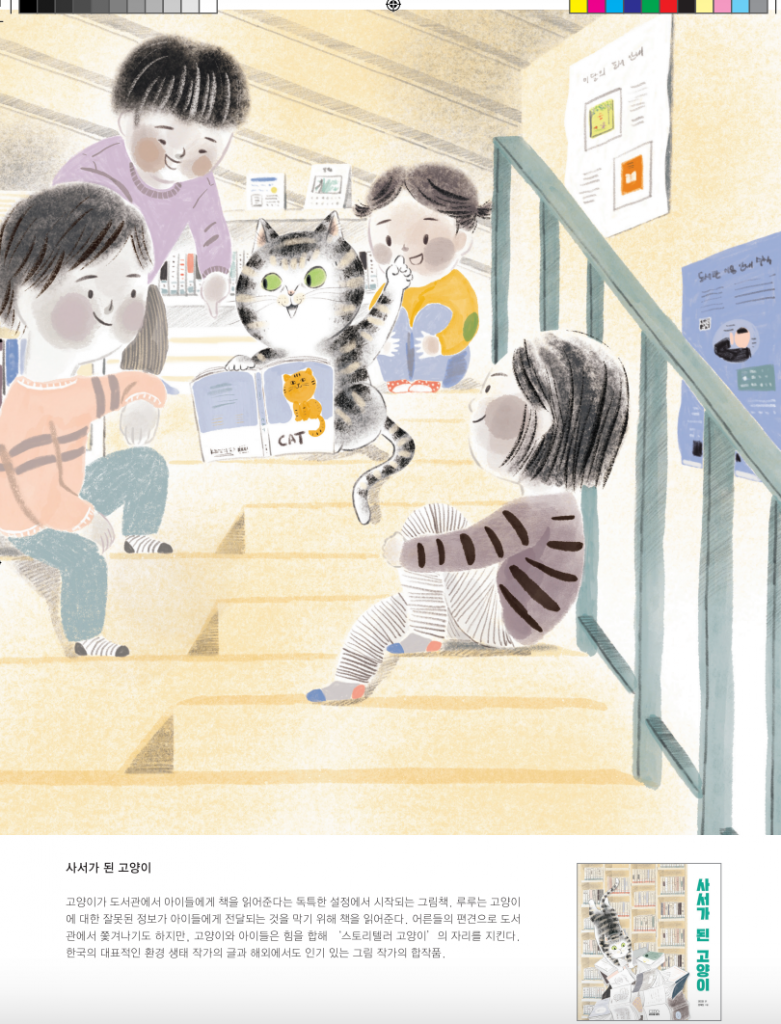
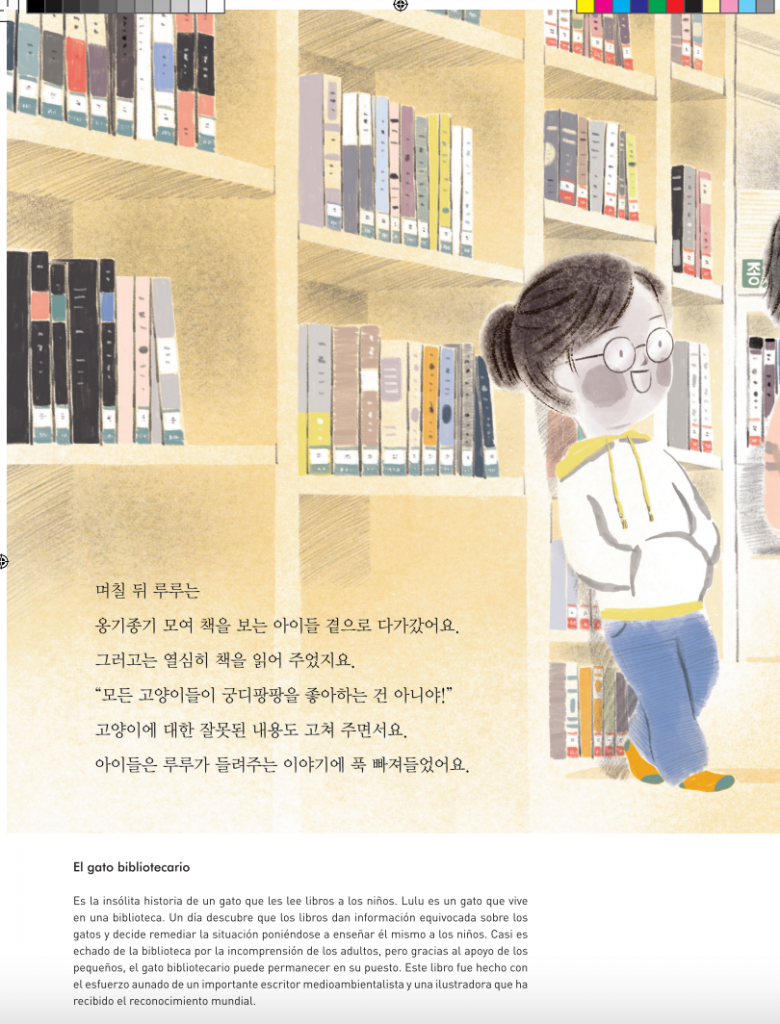
The first two images show pages from The Cat Who Became a Librarian, which features tales of a cat named Lulu who entertains child patrons at a library by reading books to them. Lulu takes on the role of a storytelling librarian to promote a better understanding of cats and their behavior by her informational tales. In the final image, the Korean on the page depicts the phrase, “They grew fine garlic,” while the image from the book A Comer/Let’s eat shows a bustling market with farmers bringing their homegrown crops to sell at the farmers’ market.
In addition, the online awards ceremony of the 1st Korean-Arab Picturebook Translation Competition, jointly organized by the Korea-Arab Society (KAS) and the International Children and Youth Book Association (KBBY), took place on August 18, 2023 with the support of the Ministry of Foreign Affairs and the Etihad Oil Science and Culture Foundation.
This competition, in which Korean students majoring in Arabic and Arab students majoring in Korean translated Korean picture books into Arabic, was carried out over the course of approximately four months starting in April. A total of 256 students from 10 universities in four countries, including South Korea, Egypt, the United Arab Emirates, and Jordan, showcased their linguistic and cultural exchange abilities through picturebooks, leading to a total of 20 winners. Among them, four individuals, Changjin Jang from Korea University, Hanin Kairi from Ain Shams University in Egypt, Maha Al-Mansouri from a UAE university, and Mais Karaikat from a Jordanian university, received first prize. Korean students presented their acceptance speeches in Arabic and Arab students in Korean, receiving enthusiastic applause from approximately 200 attendees.
The online awards ceremony that connected the four countries had the participation of three Arab ambassadors, including Azmi Al-Tall, the Jordanian Ambassador to South Korea. In his speech, the Deputy Ambassador Issa Al-Samaha from the United Arab Emirates expressed his gratitude, stating, “I am grateful for highlighting the important members of our society, the children.” The event was diverse, including the screening of a congratulatory video from the popular idol group B.I.G, which is highly loved in the Arab world as a cultural expressed for the Korean-Arab Society.
Ma Young-sam, the Secretary-General of the Korean-Arab Society, announced plans to further develop this competition to enhance publishing exchange between the two countries and promote it as a cornerstone of cultural exchange. Figure 3 is the winner of Arabic translation from a Korean picture book, Did you just say I’m Cute? by In-chan, Hwang and illustrated by Myungae Lee (2022).
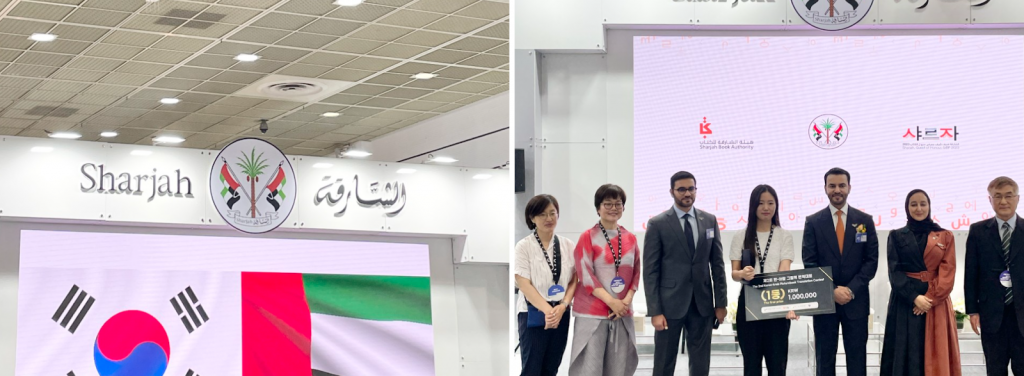
Figure 3: The winner of Korean-Arabic Translation Contest at the Seoul International Book Exhibition in 2022.
In conclusion, I wish to celebrate intercultural events that bring together languages and cultures from contemporary nations across different countries. We currently live in a rather tumultuous period, and my hope is that languages and cultures can become more accessible through children’s literature. By fostering young readers’ curiosity and desire to explore literature from around the world, we can encourage the growth of language richness rather than allowing language to be a barrier in enjoying intercultural stories.
References
BomByut (2023). 2023 Korea-Arabic Picture Book Translation Contest Ceremony– A student winner translated, Korean picture book, Did You Say I Am Cute? Is the Winner at https://blog.naver.com/springsunshine/223129471023
Byun, Y.H (2021). Cultural Solidarities Construction with Picture Books. Korean Board on Books for Young People.
Lee, J. R. (2022) Korean Picture Books to Spanish Language and Mexican Picture Books/ to Our Languages/한국 그림책 스페인어로, 멕시코 그림책 우리말로. Yunhap News. https://www.yna.co.kr/view/AKR20221212018700087
Shaw, L. (2023). Korean TV builds a boom that has global streams piling into Seoul. Bloomsberg Linea. https://www.bloomberglinea.com/english/korean-tv-builds-a-boom-that-has-global-streamers-piling-into-seoul/
WOW Currents is a space to talk about forward-thinking trends in global children’s and adolescent literature and how we use that literature with students. “Currents” is a play on words for trends and timeliness and the way we talk about social media. We encourage you to participate by leaving comments and sharing this post with your peers. To view our complete offerings of WOW Currents, please visit its archival stream.

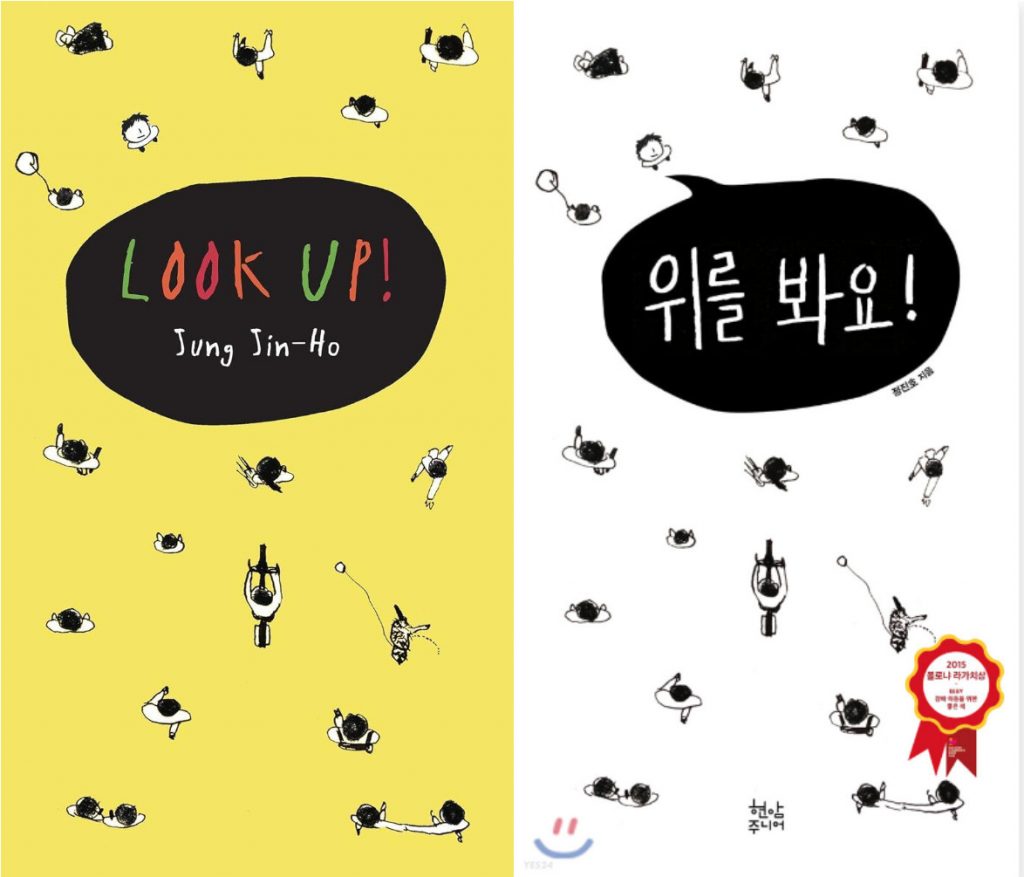
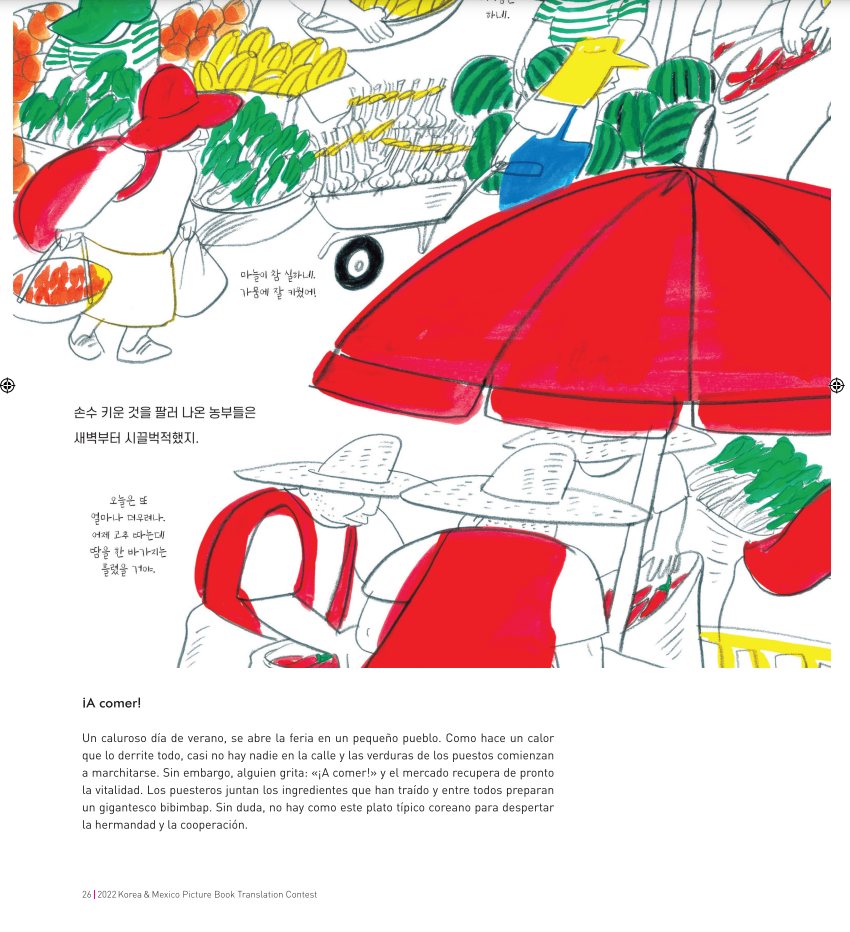
Thanks for sharing this. very interesting blog. When I hear translation, always English-Spanish, English-Korean, English-Japanese, English and other languages come to my mind. But, yes, of course, there are translated books of Korean-Arabic, Korean-Spanish, and more. Interesting to see translated books around the world. I also want to see more picture books in other countries.
Thank you for sharing your thoughts, Junko! I look forward to more opportunities for language celebrations through global book events.